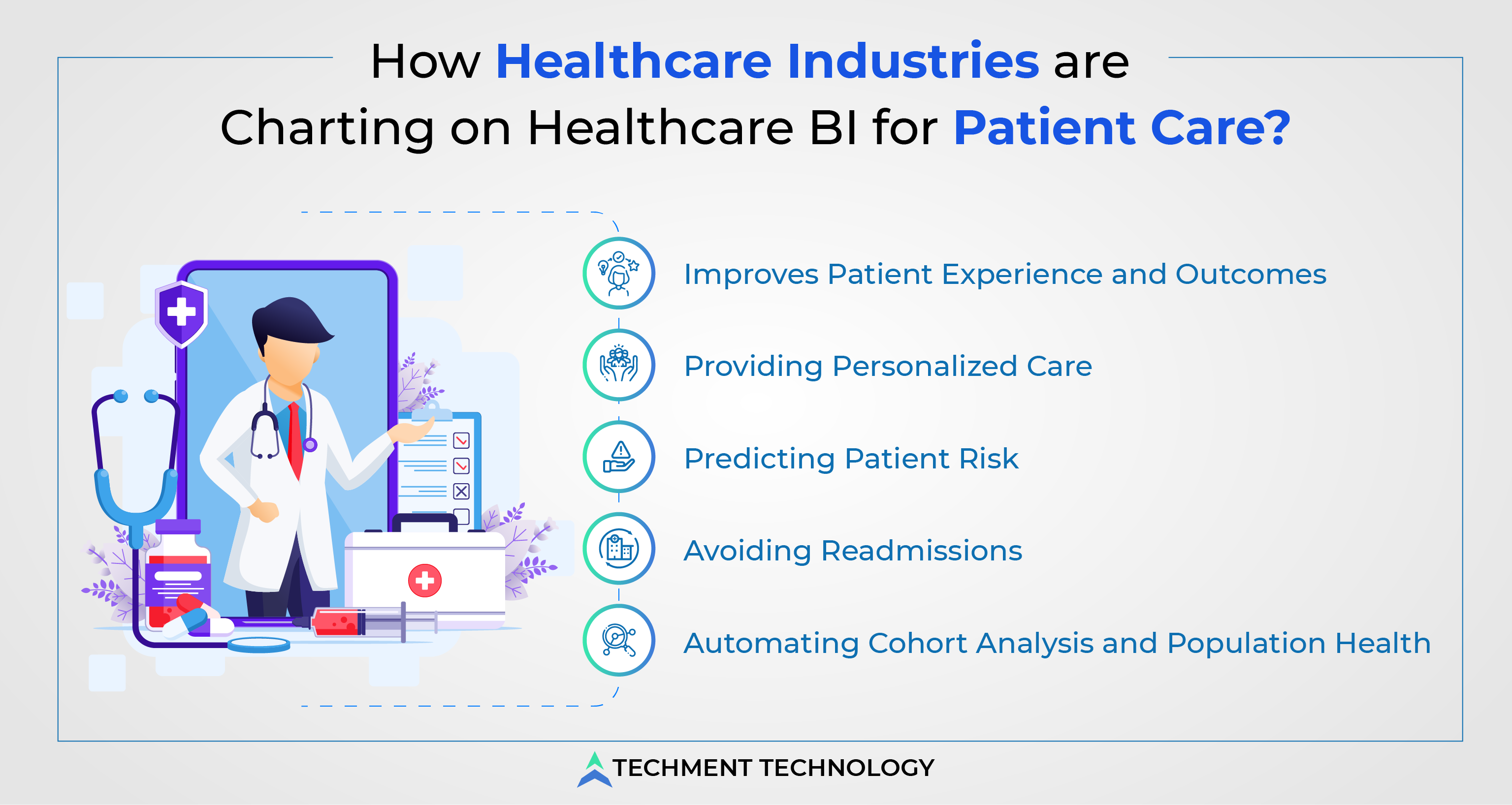Healthcare BI will Elucidate Essential Health KPIs
Business intelligence is an umbrella term that encompasses several critical business information and extracting raw information and converting it into useful decision-making information. Healthcare being a crucial service, the identification and measurements of key performance indicators (KPIs) facilities are vital to improving performance. These KPIs have an impact on:
- Results of healthcare facilities like patient experience.
- Emergency, pre-treatment, and repair in healthcare facilities.
- Safety and management in healthcare.
Healthcare business intelligence (BI) helps is the process by which the above KPIs from massive healthcare data can be collected, refined, and can be turned into actionable insight from four key areas i.e., costs, pharmaceuticals, clinical data, and patient behavior. As the healthcare industry is moving towards a data-driven world, the demand for healthcare BI tools is increasing, especially cloud-based business intelligence (BI) tools, as it improves patient experience and is cost-efficient. According to a Grand View Research report, the global healthcare business intelligence market size is expected to expand at a compound annual growth rate (CAGR) of 13.5% from 2022 to 2030.
BI tools allow organizations to create visualizations and reports using data from patient questionnaires and surveys, electronic health records, and other sources. Healthcare BI tools are required to highlight the anomalies in the system and help predict what resources and training are required for future provisions of quality patient-centric services.
How Healthcare Industries are Charting on Healthcare BI for Patient Care?
Business intelligence in healthcare is expected to play a key role in providing intelligent healthcare solutions for patients, providers, clinicians, etc. Be it diagnostic analytics or descriptive analytics, healthcare BI platforms will help in getting the most out of them. Right questions and diving deep for the results will bring insights on improving patient experience and population health. These are some areas where BI fits into healthcare:

- Improves Patient Experience and Outcomes: BI in healthcare improves patient experience and outcomes. Also, BI tools allow organizations to determine whether patients need to stay for a targeted period. Organizations can keep track of data to see whether their stay lengths for patients are being met. Also, they can track whether treatments are successful and healthcare organizations can look into how to improve their treatment practices, evaluate drug efficacy, and improve staffing decisions with help of diagnostic analytics.
Using BI providers can predict which patient needs more attention, and who requires more care. Further, forecasting readmissions and taking preventive steps will help to provide improved outcomes.
- Providing Personalized Care: In 2021, healthcare industries gained access to a plethora of data through patient records like EHR, EMRs, medical pictures, etc. Adapting these patients’ records could be harnessed in their health journey at key times, provide customized care, and can develop patient-centric care delivery. Metadata in BI tools suggests medical professionals take action sooner on health worsening, leading to decreased risk to patients.
Predictive analytics in BI tools help sort data spans to a wider area of determining specific risk factors, especially for patients with chronic conditions. BI with predictive analytics finds previous patterns providing personalized care and reducing readmissions.
- Predicting Patient Risk: With BI-predictive analytics, it is possible to forecast bigger patient risks. Prediction of disease and chronic illness based on the research can lead to early treatment which helps reduce hospital readmission rates. With such patients, clinic footprints can be avoided and proactive treatment could be given through direct communication.
Also, it aids in identifying people who are at high risk of developing chronic conditions so that preventive care can be given before disease progression.
- Avoiding Readmissions: Avoiding readmissions requires an overwhelming amount of data or medical history which BI softwares is capable of handling. It’s not always about incorrect treatment but failing to follow the schedules by patients, or failing to attend appointments also contribute to readmissions. BI tools consider all these factors and help them resolve without the need for readmissions. Like the tools are capable of predicting that a patient would experience a certain set of symptoms within the next few days. Following this, a clinician can ask the patient to attend the appointment immediately and prevent escalation.
- Automating Cohort Analysis and Population Health: Analyzing large amounts of data that include medical conditions and demographics helps in reading the cohort health patterns and population health. The pattern determines which population to target for their campaigns. In certain cases, BI can also predict outbreaks and alert healthcare providers before they are out of control.Clustering historical data of similar chronic illnesses would help analyze certain outbreaks and how they will affect them in the future.
BI provides the above opportunities to healthcare organizations to improve the patient experience. This not only improves interaction with patients but also improves hospital operations and staff allocation.
Conclusion:
Healthcare Industry will be Observant on Inherent Disease Tracking Through BI
Prediction and prevention are the rising trends in healthcare to improve patient expectations. Using data and BI, better insights on patterns and factors, both genetic and behavioral can be studied, and accordingly, preventive measures can be adopted. Personalized medicine is another growing trend as patient data becomes more accessible and the means to analyze it becomes easier. Soon the treatment protocols will move from a one-size-fits-all model to treatments based on each patient’s medical history and current medical issues.
Analysis of inherent disease or genetic markers will also increase allowing the physicians to step into early prevention or reduce its impact on patients. Healthcare industries would be able to more precisely target the precise treatment using BI and data analytics. Business intelligence brings hope of improving patient outcomes while reducing cost by providing the right treatment at the right time.
Techment Technology has capable engineers who can develop dashboards and create business intelligence tools that are capable of handling and consolidating large amounts of datasets. For more information, get in touch with us.
 All Posts
All Posts